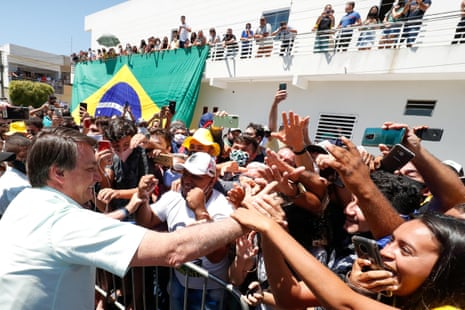Brazil’s hard-right president, Jair Bolsonaro, dismissed Covid-19 as a “little flu”, and said it should be faced “like a man, not a boy”.
He sneered that self-isolating was “for the weak” and raged against lockdown measures. He clashed with state governors, and his own former health minister savaged his handling of the pandemic.
But as Brazil counts nearly 5 million Covid-19 cases and more than 147,000 dead, Bolsonaro is more popular than ever.
Like his idol Donald Trump, the populist Brazilian leader caught the virus and emerged apparently unscathed. But while the US president trails Joe Biden in the polls, Bolsonaro’s government has hit a record 40% approval rating.
Much of that popularity is down to monthly emergency aid payments of £83 ($108) – or £166 ($217) for single mothers – that about 67 million Brazilians began receiving in April.
Giselly Andrade, 34, worked as a cashier until her second child, Gabriel, five, was born with microcephaly. She lives in Recife, in the state of Pernambuco – the poor north-east region that has traditionally been the electoral heartland of the leftwing Workers’ party, which ruled Brazil from 2003-2016. Now, however, support for Bolsonaro is growing in the region, where 65% have received emergency aid.
Andrade is one of them – and the payments helped change her view of the president.
“I didn’t expect this of him,” she said. “People said he only thought about himself [but] he’s shown the opposite.” Andrade spoiled her vote in 2018 but said she would now vote for Bolsonaro when he runs for re-election in 2022. “He’s been working, thinking of the people,” she said.
“He became a hero,” said Ricardo Fernandes, 31, an actor from Rio’s City of God favela who organized food deliveries to the community. Fernandes said Bolsonaro’s social media propaganda persuaded people he was behind the payments – when actually the government originally proposed a much lower value before congress forced an increase.
But Bolsonaro’s rising popularity has come at a price Brazil may not be able to afford for much longer. The emergency aid payments were halved last month and are due to end in December, potentially leaving nearly 40 million people adrift, according to a new study from the Getúlio Vargas Foundation, a leading business school.
According to research by Renato Meirelles at Locomotiva, a research institute specialising in low-income Brazilians, 51% of Brazilians are now receiving either the emergency aid or the “Bolsa Família” cash-transfer scheme introduced by the Workers’ party president Luiz Inácio Lula da Silva.

But as Bolsonaro shows no sign of wanting to raise taxes for Brazil’s super rich, he will have to penalise ordinary Brazilians or cut spending. “There’s no magic solution,” said Felipe Salto of the independent fiscal institution, Brazil’s equivalent of the UK’s Office for Budget Responsibility.
Wilma da Silva, 51, who lives with her 10-year-old niece in the the Amazon city of Belém, started receiving emergency aid after losing her job as a maid when the pandemic hit.
She voted for Bolsonaro in 2018 but, since the £83 monthly payment was halved and rice prices soared, wouldn’t do so again.
“I don’t know what I am going to do to keep a house with a child … pay for electricity, water, buy food,” she said. “There are many families going through what I’m going through in Brazil.”
Bolsonaro now plans to introduce a new, revised Bolsa Família scheme next year called “Citizen Income” that will include some emergency aid money. It will have his stamp on it, just as the Bolsa Família is identified with Lula, his arch-rival.
Brazil already had a £17bn ($22bn) deficit target before the pandemic hit and it is now expected to soar to more than £125bn – a serious problem for a developing country with a history of hyperinflation and political instability, said Gil Castello Branco, an economist and founder of the non-profit public spending watchdog Open Accounts.
Brazil’s currency, the real, has plummeted, foreign investment flooded out of the country, 13 million people are unemployed and markets fret Bolsonaro will take a populist route, spending money his government doesn’t have to ensure re-election.
“There is a thin line between a deficit that can be controlled and it getting out of control,” Castello Branco said.
He warned that some financial manoeuvres floated by Bolsonaro’s economic team to fund the Citizen Income scheme bordered on “creative accounting” and alleged budget irregularities that, officially at least, drove the controversial impeachment of the leftist president Dilma Rousseff in 2016.
But Bolsonaro has an advantage, said Meirelles: the political opposition’s failure to capitalise on his mistakes.
Bolsonaro broke his own campaign promises to form alliances with mercenary, “pork barrel” parties in Congress, stopped attacking the supreme court and originally wanted the emergency aid payment to be a third of what it became.
Congress forced it higher, and Bolsonaro reaped the political reward. But now he is stuck with it.
“If the emergency aid does not become public policy like the Bolsa Família, there’s no chance of re-election,” Meirelles said. “It’s almost an issue of survival.”
